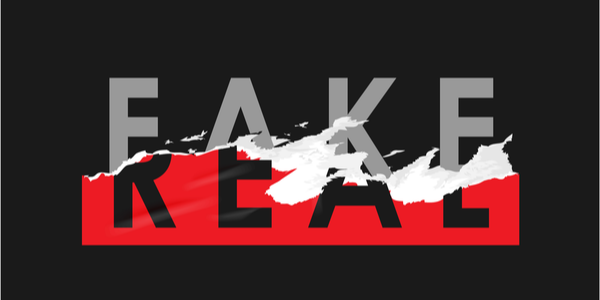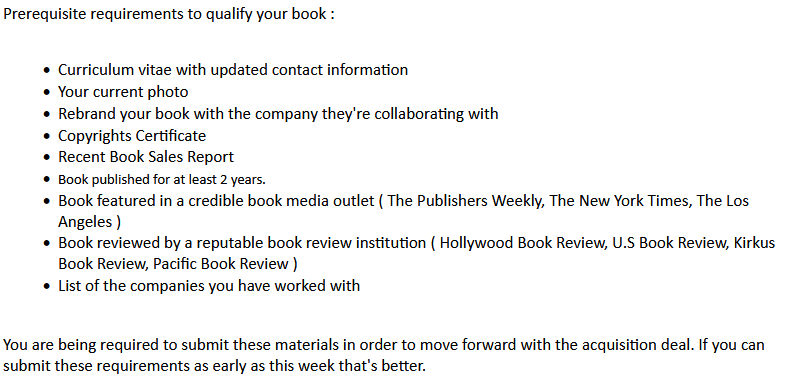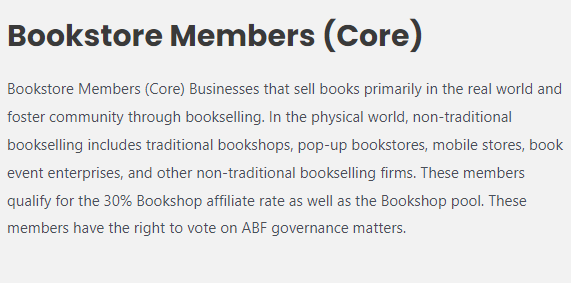
As you’ll know if you’re a regular reader of this blog (and from your own experience if you’ve ever self-published), we are currently in the midst of a tsunami of scam companies that aggressively solicit authors with out-of-the-blue emails and phone calls touting phony services–“endorsement” to Big 5 publishers or major film studios, “nominations” for representation at book fairs or other costly-but-useless PR strategies, and more.
These ripoff artists often seek to boost their credibility–and stroke writers’ egos–by naming some made-up organization or group that has recommended or otherwise validated the author’s book. The Guild of Literary Agents, Book Acquisitions Guild of America, Book Acquisition Society, The Literary Arts Organization, Affiliation of Creator Agents, Hollywood Database, Literary Review of Books…I could go on, but you get the picture. Despite the official-sounding names, none of these so-called organizations (which I’ve seen referenced in multiple scam solicitations) exist–as even a cursory websearch will confirm.
Scammers, of course, are counting on writers not to check. But writers have become much more savvy about solicitation scams than they used to be–partly because there are now so many of them, and partly because there are so many warnings about them. This has caused some predators to up their game, attempting to create credibility for their made-up endorsement organizations by giving them actual websites.
I ran across two of these this week.
American Booksellers Federation

I learned of the American Booksellers Federation (ABF) via a report of a book purchase scam (authors are contacted to either buy a huge number of books or pay a percentage of a big order already made, with a promise of brick-and-mortar bookstore placement–here’s an example).
The ABF website looks quite professional, with attractive visuals and grammatical text (which as you’ll know from reading here is not normally a feature of scammers’ websites). There’s a reason for that: much of the American Booksellers Federation website text has been stolen from the website of a real booksellers’ trade group: the American Booksellers Association (ABA). It’s no accident the two names are so similar: in fact, if you Google American Booksellers Federation without quotes, Google will serve up the ABA website as the first entry.
Here are some examples of stolen text. Note that the ABF has lightly altered the wording, no doubt in hopes of evading plagiarism claims–but didn’t bother to change the sentence order.
There’s also plagiarized content from Bookshop.org and the European and International Booksellers Federation.
Clearly the scammers who created the ABF (I don’t know who they are yet but I’m sure I’ll figure it out) are relying on the authors they solicit not to think it’s odd that the ABF has zero web presence beyond its website, or to notice that most of the things you’d expect to find on a real trade association’s website are missing: no resources for booksellers or publishers, no events or advocacy, no list of member benefits or services–and, crucially, no way to join. They’re certainly hoping no one will check the ABF’s domain registration and discover that it’s less than four months old.

UPDATE 6/2/23: Here’s the reply received by a writer who contacted the ABA about the ABF scam:

Additionally, I’ve gotten a second report of a supposed “book purchase order” from the ABF, using the name Mary Lee. “Mary Lee” is a name associated with a complex of scams that’s mostly doing business these days as Quantum Discovery or QDiscovery. So we now know who’s behind it.
The Acquisitions Guild

The Acquisitions Guild also has a fairly nice-looking website, although the alert observer will note that it’s rather bare of content and the text…well, some of it is a bit shaky. The AG (it’s not coincidental that a real industry group, the Authors Guild, has the same initials) has been around a bit longer than the American Booksellers Federation, but not much: its domain was registered on February 1 of last year.
Prominent at the top of The Acquisitions Guild’s website is a flipbook of “success stories” featuring the names and images of authors who in some cases have transitioned from self- to traditional publishing. These authors’ pub dates long precede the Acquisitions Guild’s existence, which makes claiming them as its own success stories rather implausible–so I reached out to one of the authors to ask if he’d given permission to be included. Here’s his response:

Not exactly a surprise–given that in this case, I know who the scammer behind The Acquisitions Guild is:

Page Turner Press and Media is among the most predatory and dishonest of the many publishing/marketing/fake literary agency scams operating out of the Philippines–which, believe me, is saying something. It’s part of a complex of scam companies that function in their home country as Innocentrix; I’ve documented at least eleven business names in this complex, including Page Turner.
I’ve gotten complaints from writers who have lost tens of thousands of dollars to Page Turner, encouraged by its sales reps to spend more and yet more money on bogus services. I’ve heard from writers (or their relatives: like other scams of this type, Page Turner preys on vulnerable senior citizens) who have paid Page Turner’s subsidiary operation, The Metro Films, in excess of $100,000 for a “publicity campaign” to supposedly ensure their book would be made into a movie.
You can see examples of similar complaints on Page Turner’s BBB listing.
Compared to Page Turner’s other deceptions, The Acquisitions Guild is small potatoes. It’s a tool, though–a way to appeal to the writer’s ego with fake validation, hopefully to soften the writer up for the inevitable money demand. Here’s the “list of requirements” mentioned in the email above:

This is what a re-publication scam (“rebrand your book”) looks like, with added expense for “publicity” (group ads in PW etc. and pay to play reviews). Overall cost: four figures for sure, probably somewhere between $2,500 and $5,000.
Re-publishing offers–which frequently, as here, are falsely pitched as something required for acquisition by Big 5 publishers–are a way for scammers intent on extracting money from their victims to draw writers in so they can be pressured to spend major cash on additional “services”, and/or targeted for more serious fraud, such as fake publishing or movie rights offers involving huge upfront fees. Such offers are a very common scam approach, used by multiple companies–though few are as audacious, or as egregious, as Page Turner Press and Media.
Writer Beware, indeed.
How to Protect Yourself
Obviously, all claims made in an out-of-the-blue email or phone call should be carefully investigated to see if they check out. The two fake organizations discussed above show how scammers can potentially sidestep that strategy, however.
The main thing to remember: reputable agencies and publishers only very rarely reach out to authors they don’t already work with. Ditto for producers and film companies. For scammers, on the other hand, solicitation is their main method of recruitment.
You’re safest if you assume that ANY solicitation you receive is a scam, especially if it seems too good to be true–at least, until you can definitively establish otherwise. Check this list to see if the company is on it. If not, or if you have further questions, email me: if I have information, I will gladly pass it on.






I am a John Doe and hired someone in the dark web to look for these specific people in the Philippines because I got ripped for $842 850 in just two months by a specific company and unfortunately, our government won’t take action about it. I am planning to build a company in PH that will look for these individuals and let’s say with a word I can let them die on their own soil. if you’re one let me know what you want to get june-nickel.0p@icloud.com
What is the name of the company? Perhaps I know their office in the Central Philippines
I had a director reach out, much to my astonishment. He did not do it by emailing out of the blue, though. In my case, I was contacted by a third party corporation that passed my email address to the director’s attorney who then emailed me asking if I was interested and set up a meeting with the director. We then negotiated an option agreement. I suspect that is pretty typical of the sort of process that might happen when lightening does strike. (He shopped it and like 90+% of the optioned novels ended up not being greenlit.) It is highly improbable that any director/producer or publishing company would ever just email out of the blue. And you have to feel terrible for the rather vulnerable sounding people these thieves scam. Thank you for all your wonderful work, Victoria.